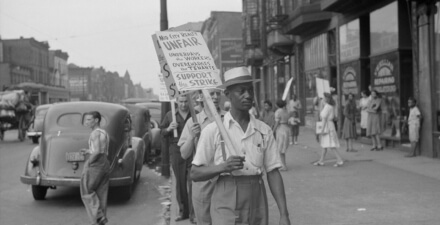Increasing evidence demonstrates the ways in which bargaining power shapes economic outcomes. One’s economic success is not merely defined by individual characteristics such as education. Equitable Growth’s work on unions and collective action in the United States examines the ways in which institutions intersect with economic trends and individual characteristics to ensure that workers can share in the gains of the economic growth to which they contribute.
Featured work
Will labor’s surging popularity result in new union members in the United States?
August 29, 2024
August 29, 2024
Unions in the United States improve worker safety and lower health inequality
December 13, 2022
December 13, 2022
Factsheet: How strong unions can restore workers’ bargaining power
May 1, 2020
May 1, 2020
Unions and the enforcement of labor rights: How organized labor protects U.S. workers against unfair and illegal employment practices
April 29, 2022
April 29, 2022
Aligning U.S. labor law with worker preferences for labor representation
February 18, 2020
February 18, 2020
Explore Content in Bargaining Power377
The political implications of bad jobs and the decline of unions
May 13, 2025
May 13, 2025
Request for Proposals: The economic effects of the Inflation Reduction Act
April 2, 2025
April 2, 2025
Boosting U.S. worker power and voice in the AI-enabled workplace
February 19, 2025
February 19, 2025
Request for Proposals: Promoting competition and supporting workers in an era of AI innovation
November 20, 2024
November 20, 2024
Request for proposals: Research grants for early career scholars
October 30, 2024
October 30, 2024
Equitable Growth renews collective bargaining agreement with Nonprofit Professional Employees Union
October 7, 2024
October 7, 2024
Estimating the prevalence of automated management and surveillance technologies at work and their impact on workers’ well-being
October 1, 2024
October 1, 2024
Will labor’s surging popularity result in new union members in the United States?
August 29, 2024
August 29, 2024
Worker Led Lawsuits: The Effects of California’s Private Attorney Generals Act
August 27, 2024
August 27, 2024
New federal heat standard will protect U.S. workers from the ill effects of high temperatures amid intensifying climate change
August 1, 2024
August 1, 2024
New federal heat standard offers novel distributional analysis to determine which workers benefit and how
July 16, 2024
July 16, 2024
A researcher’s guide to identifying policy-relevant research questions for the federal government
May 30, 2024
May 30, 2024
Explore the Equitable Growth network of experts around the country and get answers to today's most pressing questions!


















